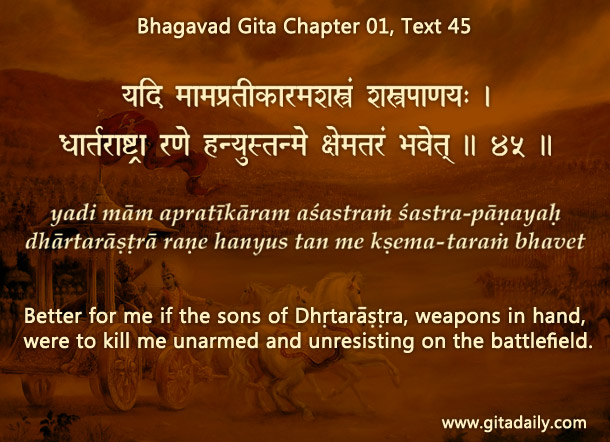What defines who we really are? – At the start of the Bhagavad-gita, Arjuna feels hesitant to engage in the Kurukshetra war because he feels that a kingdom is not worth killing his relatives (01.35) or destroying his dynasty (01.39-42). Anticipating the counterpoint that his opponents aren’t as considerate as he is, he explains that their actions, though reproachable, are understandable because they are blinded by greed (01.37). However, because he isn’t similarly blinded, he won’t stoop to their level and fight for a mere kingdom (01.38). Better that he refuse to fight and die at their hands (01.45).
His point of not stooping to the level of one’s opponents is valid — if we let those whom we are confronting drag us down to their level of consciousness, we will make bad things worse. But Arjuna’s point isn’t universal — even though he is fighting just as his opponents are, his motivations don’t have to degenerate to their level.
The Gita reveals how he can fight with a nobler motivation: to establish the rule of virtue and spiritual culture in the outer world (11.33) and to through that endeavor establish himself in the ultimate spiritual virtue of devotion (11.55). The more we become a channel for the Divine in a mood of service, the more we become connected with the Divine, thereby transcending worldly entanglements even while being in seemingly worldly engagements.
In fact, the entire Gita is spoken to highlight what really defines who we are. Our consciousness, which is essentially who we are, is revealed not so much through our external actions as through our internal motivations.
One-sentence summary:
Just because two people’s actions are the same doesn’t mean that their motivations are the same — to understand who we really are, focus on our inner motivations, not on our outer actions.
Think it over:
- What is Arjuna’s concern about fighting the war?
- How does the Gita address Arjuna’s concern?
- How can we understand who we really are?
***
01.45: Better for me if the sons of Dhritarashtra, weapons in hand, were to kill me unarmed and unresisting on the battlefield.


Leave A Comment